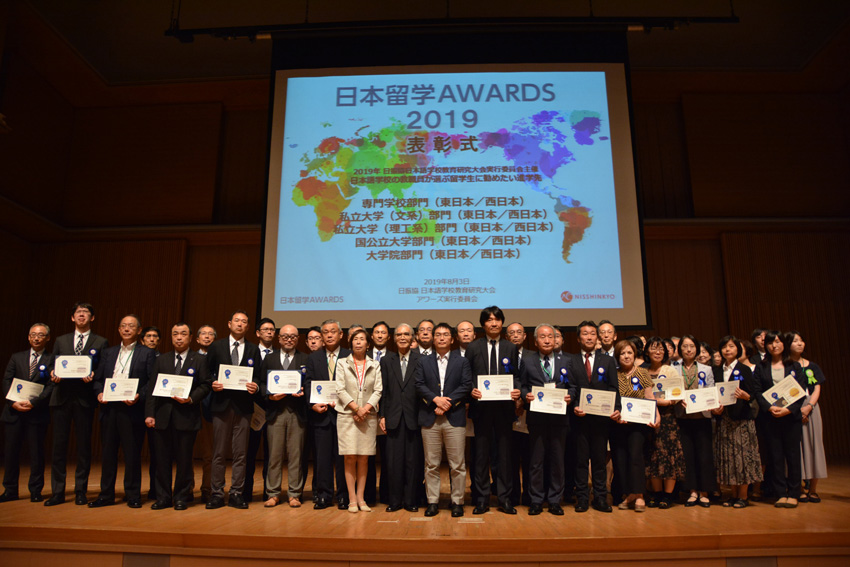
WAward winners pose at the eighth Japan Ryugaku Awards ceremony, held at the National Olympics Memorial Youth Center in Tokyo's Shibuya Ward on Aug. 3. COMMITTEE OF JAPAN RYUGAKU AWARDS
Achievements bring to light further areas for growth
October 7, 2019
SPONSORED CONTENT
In recent years Japan has seen an increase in international students attending universities, vocational schools and language schools in Japan. Many educational institutions have responded to this trend by streamlining their admissions procedures and implementing support programs to make life easier for international students.
Among these institutions are those that go above and beyond in their support of international students with exemplary academic programs, extensive Japanese language curriculum and quality-of-life support. To recognize the accomplishments of these universities and vocational schools, the Association for the Promotion of Japanese Language Education hosts the Japan Ryugaku (study abroad) Awards, conferring awards to institutions that make considerable efforts in assisting international students.
The Association for the Promotion of Japanese Language Education launched the Japan Ryugaku Awards in 2012 in order to boost the number of international students in the wake of the Great East Japan Earthquake and tsunami of March 2011. Many students at Japanese language schools returned to their home countries at the time. Since then, language schools have selected award recipients based on numerous criteria, such as providing easy-tounderstand materials, establishing separate tracks for international students, simplifying application procedures and developing a support system to help students find jobs in Japan. By also establishing criteria to assess institutions' accommodations for international students, the association hopes to provide a framework that schools and universities can use to improve their learning environments.
This year marked the eighth Japan Ryugaku Awards ceremony, held at the National Olympics Memorial Youth Center in Tokyo's Shibuya Ward on Aug. 3. The ceremony was attended by faculty and staff of universities and language schools, as well as related business representatives.
This year, 161 language schools submitted 466 votes to select 50 institutions across five categories: vocational schools, private liberal arts departments, private science departments, public universities and graduate schools. Ten institutions separated into west Japan and east Japan divisions were awarded within each category. A grand prize was awarded to one institution in each division.
In the vocational school category, Tokyo International Business College received the east grand prize and Tsuji Culinary Institute, the west grand prize. Concerning private liberal arts departments, Toyo University received the east grand prize and Kwansei Gakuin University, the west grand prize. In the category for private science departments, Shibaura Institute of Technology won the east grand prize and Kindai University earned the west grand prize. In the national university category, Yokohama University received the east grand prize and Osaka University, the west grand prize. Lastly, in the graduate school category, Hitotsubashi University received the east grand prize and Ritsumeikan University, the west grand prize.
In addition to acknowledging the achievements of vocational schools and universities, the Japan Ryugaku Awards presents an opportunity to address issues concerning non-Japanese students. One area touched upon in this year's ceremony was how institutions should evaluate prospective students' Japanese language ability.
It is commonly accepted that prospective students must pass level N2 of the Japanese Language Proficiency Test (JLPT) before entering a program conducted in Japanese. It is observed, however, that students who have passed this exam still have trouble understanding their instructors and classmates. Meanwhile, students from China or Korea who have prior knowledge of kanji reflect a much greater success rate in passing these exams than students from other regions who don't have any previous knowledge of kanji. Japanese language schools generally teach their curriculum over the course of two years, but students from different regions will find themselves at completely different levels by the end of the curriculum due to the aforementioned factors. This demonstrates the limitations of a onesize-fits-all approach to establishing a curriculum. The association hopes these observations will lead to new approaches in addressing the issue.
Japan's educational environment has undergone several developments since the Japan Ryugaku Awards held its first ceremony in 2012. For one, language schools have received more recognition in society. Language schools comprise a major part of the educational ecosystem for international students. School staff are intimately aware of enrollment procedures for universities and vocational schools as they often guide their own students through the application submission process, which makes them uniquely qualified to select recipients of the Japan Ryugaku Awards.
Reflecting on these changes, Principal of Yoshida Institute of Japanese Language Hatsue Ichijo said, "When we first started these awards, Japanese language schools didn't receive a lot of recognition. As a result, society didn't acknowledge the accomplishments of these schools' students or teachers. This has changed, however, with more of society now acknowledging the important role of Japanese language schools."
During the ceremony, the association noted that while vocational schools and private liberal arts departments communicate exceptionally well with language schools, national universities and science departments have considerable room for improvement in this area. Ichijo observed that this situation may be in part due to the way in which these institutions weigh Japanese language ability when evaluating prospective students.
"At national universities, for example, many students can enroll without any Japanese language ability. National universities tend to offer more scholarships than private institutions and many of them value English language ability over Japanese language ability. This means students are able to enroll in these universities and receive scholarships without knowing any Japanese. I assume the goal of these universities and the government that funds them is to attract exceptional individuals who will work in Japan after graduating," she said. "However, if these students don't understand Japanese, they'll likely leave Japan and take their expertise elsewhere. Therefore, I think it's important that these institutions give more weight to Japanese language ability and more consideration to students attending Japanese language schools. There's this notion that Japanese is too difficult to learn. But this isn't true, and I hope this attitude will change."
Ichijo emphasized the important role Japanese language schools play in cultivating individuals who can truly assimilate into Japanese society. "Japanese language schools tend to make the news every now and then, but it's usually negative coverage. The media will cover a scandal concerning a particular school, but they won't highlight the many students who have graduated from language schools and developed successful careers in Japan," she said. "I hope society can pay more attention to these students and, in return, learn about the important role Japanese language schools play in cultivating productive members of society who go on to attend vocational schools or universities and develop careers in Japan."
2019 Ryugaku Award winners
Japan Electronics College (inducted in 2016), Waseda University's graduate school (inducted in 2017), Fukui University of Technology (inducted in 2018), Ashikaga University (inducted in 2018)
Senmon gakko (vocational schools) category
Tokyo International Business College, Tsuji Culinary Institute
Private university bunkei (humanities, social studies, literature, etc.) category
Toyo University, Kwansei Gakuin University
Private university rikei (science, math, engineering, etc.) category
Shibaura Institute of Technology, Kindai University
Public university category
Yokohama National University, Osaka University
Graduate school category
Hitotsubashi University's graduate school, Ritsumeikan University graduate school
Senmon Gakko (vocational schools) category
Tokyo International Business College, Chuo Computer & Communication College, Nippon Omotenashi College, Nihon Kogakuin College, Waseda-Bunri College of Arts & Sciences, Art College Kobe, Ehle Institute, Syusei Technical College, Tokyo International Business College Kobe Campus, Tsuji Culinary Institute
Private university bunkei (humanities, social studies, literature, etc.) category
Shobi University, Seigakuin University, Takushoku University, Toyo University, Hosei University, Kansai University, Kwansei Gakuin University, Nagoya University of Economics, University of Marketing and Distribution Sciences, Ritsumeikan University
Private university rikei (science, math, engineering, etc.) category
Shibaura Institute of Technology, Tokai University, Tokyo Denki University, Tokyo University of Science, Waseda University, Kindai University, Osaka Institute of Technology, Osaka Sangyo University, Nagahama Institute of Bio-Science and Technology, Ritsumeikan University
Public university category
Tokyo Metropolitan University, Chiba University, Tsukuba University, Tokyo Institute of Technology, Yokohama National University, Osaka University, Kyoto University, Osaka Kyoiku University, Shizuoka University, Kobe University
Graduate school category
Tsukuba University's graduate school, Hitotsubashi University's graduate school, Aoyama Gakuin University's graduate school, Yokohama National University's graduate school, Hosei University's graduate school, Kansai University's graduate school, Kyoto College of Graduate Studies for Informatics, Doshisha University's graduate school, Japan Advanced Institute of Science and Technology, Ritsumeikan University's graduate school
On the right are introductions to six recipient schools of the Japan Ryugaku Awards, recognized for their excellence in supporting international students this year. One school has also entered the Hall of Fame after being awarded the grand prize for five consecutive years.
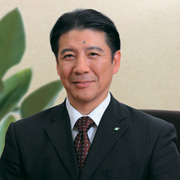
|
Japan Electronics CollegeWe promise you a bright futurePrincipal
|
|
Established in 1951, we have seenmore than 110,000 graduates joincompanies around the world.
More than 600 students fromabroad are learning at our college,and we have foreign students from 28 countries at present.
Every year, more than 90 percent of students from abroad succeed in getting a job in Japan.
We'll support you in technological learning, life and getting a job. We are looking forward to meeting you!
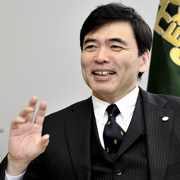
|
Shibaura Institute of Technology (SIT)Go abroad and see the worldPresident
|
|
The faculty and staff will make every effort to make your days at SIT prosperous and successful. At the same time, we hope you will spend your time being eager and enthusiastic. Do not underestimate your own potential. You may be surprised how much you can do when you really try. Don't listen to discouraging advice and don't give up easily. Keep your goal high.
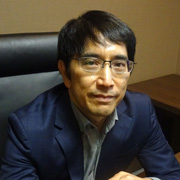
|
Tokyo Metropolitan UniversityPursue an ideal state of humanityVice President/Executive Director of the International Center
|
|
TMU, as the only public university of the Tokyo Metropolis, offers quality education based on research prowess with rich academic resources in Tokyo.
We have seven faculties and seven graduate schools that provide international students with an ideal study environment.
Almost all international students are granted tuition waivers and scholarships. We look forward to welcoming you!
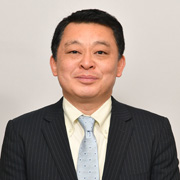
|
Tokyo Denki UniversityContribution through technologyDirector of International Center
|
|
Since its foundation, TDU has made significant contributions to society, especially in science and technology. TDU provides assistance to help international students with their academic and personal lives. The International Center and on-campus lounges offer various support and host many events. TDU also furnishes learning and career support to international students. Additionally, scholarships and financial support for them are available.
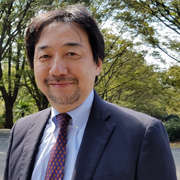
|
Tokai UniversityNurturing global human resourcesExecutive Director of International Education Center
|
|
Tokai University, enrolling more than 1,300 international students from 49 countries as of May 1, provides various support for international students, including advice on academics and career, health consultation, tutoring system and scholarship. It also promotes international exchanges in academics, culture and sports. It will aim to earn a reputation as an excellent international university and continues to educate its students to be global human resources.
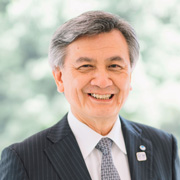
|
Yokohama National UniversityBe active, innovative, open, globalPresident
|
|
Yokohama National University, where foreign students account for 10 percent of its entire 10,000-student enrollment, offers a variety of services for non-Japanese students. These include scholarships arranged by Yokohama National University, four dormitories mainly for foreign students, support for job hunting at Japanese companies, consultation on daily life, studies and job hunting in collaboration with various organizations and student groups, as well as support on Japanese language and culture.
